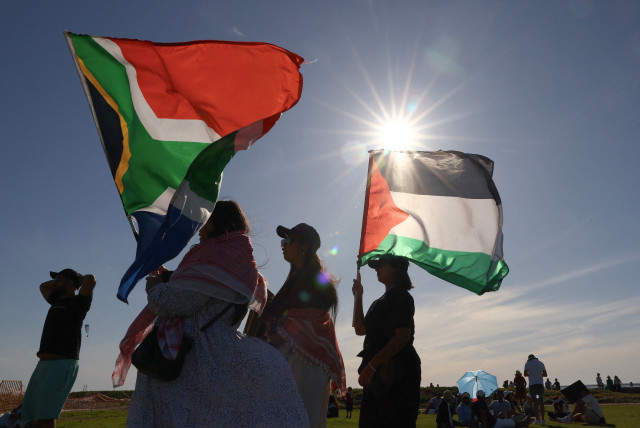Israel will defend itself at the ICJ - editorial

Israel’s decision to participate in the upcoming ICJ hearing to counter allegations of crimes against humanity in Gaza marks a significant and potentially beneficial shift in its legal strategy.
We support the decision of the State of Israel to dispute allegations of crimes against humanity directed at Palestinians in Gaza, which are expected in the coming week at the International Court of Justice in The Hague.
This judicial review was initiated by South Africa, accusing Israel of breaching the United Nations’ 1948 Convention on the Prevention and Punishment of Crimes Against Humanity.
A historic defense
“The State of Israel will appear before the ICJ at The Hague to dispel South Africa’s absurd blood libel,” government spokesman Eylon Levy told reporters in Jerusalem on Tuesday, as reported by Tovah Lazaroff.
“Israel has been a member of the Genocide Convention since its inception, and at this stage, there is no reason to boycott the [ICJ] hearing,” he said.
The decision was made that the best way to counter the “blood libel” inherent in the “genocide” allegation is to actively engage in the ICJ process. This approach is a direct reaction to South Africa’s “disgraceful” behavior. The ICJ has a duty to address South Africa’s actions, the government said.
By announcing the move, Israel has changed a longstanding policy of not participating in ICJ hearings, deciding to respond directly to South Africa’s accusations of committing genocide against Palestinians in Gaza.
In 2004, Jerusalem chose not to attend the ICJ proceedings regarding the legality of the security barrier in the West Bank.
According to our military correspondent, Yonah Jeremy Bob, the earlier choice proved to be problematic for Israel, as the ICJ concluded that the barrier was unlawful. The outcome might have been different had the court been presented with Israel’s complete argument, he said.
Conversely, Israel disregarded the verdict, citing reasons that it did not acknowledge the court’s authority and the belief that the court would naturally favor the Palestinians.
Israel continues to maintain this stance of nonrecognition and denial of jurisdiction in dealings with the International Criminal Court (ICC) and in response to investigations by the UN Human Rights Council.
A change in strategy
Israel’s decision to participate in the upcoming ICJ hearing to counter South Africa’s allegations of crimes against humanity in Gaza marks a significant and potentially beneficial shift in its international legal strategy. This move to engage directly with the ICJ signifies a proactive approach to addressing and dispelling accusations, which could help improve Israel’s international standing and narrative.
Firstly, by choosing to appear before the ICJ, Israel is seizing an opportunity to present its side of the story, something that was missing in previous international legal proceedings. For example, in 2004, Israel’s decision to abstain from ICJ proceedings regarding the West Bank security barrier led to an unfavorable ruling. This outcome might have been different had Israel articulated its case. By actively participating now, it can ensure that its perspectives and defense are adequately represented, potentially influencing the court in its ruling.
Israel’s participation in the ICJ hearing could also demonstrate its commitment to international law and this could help counter the narrative that Israel disregards international legal norms, as seen in its previous stance of nonrecognition and denial of jurisdiction in dealings with the ICC and the UN Human Rights Council. Engaging with the ICJ could show that Israel is willing to be held to the same standards as other nations.
Additionally, addressing the allegations head-on at the ICJ could help Israel mitigate the impact of what it terms as “blood libel” inherent in the genocide allegations. By presenting evidence and legal arguments, Israel has the chance to clarify its actions and policies, possibly dispelling misconceptions and misinformation. This approach not only addresses the immediate concerns at the ICJ but also contributes to a broader narrative, influencing public opinion and international relations.
Moreover, this engagement with the ICJ could offer a platform for Israel to highlight the complexities and challenges it faces, which are often oversimplified in international discourse. Presenting its security concerns, historical context, and efforts to minimize civilian harm in conflict zones can provide a more nuanced understanding of the situation, fostering a more balanced view among international observers.
Jerusalem Post Store
`; document.getElementById("linkPremium").innerHTML = cont; var divWithLink = document.getElementById("premium-link"); if (divWithLink !== null && divWithLink !== 'undefined') { divWithLink.style.border = "solid 1px #cb0f3e"; divWithLink.style.textAlign = "center"; divWithLink.style.marginBottom = "15px"; divWithLink.style.marginTop = "15px"; divWithLink.style.width = "100%"; divWithLink.style.backgroundColor = "#122952"; divWithLink.style.color = "#ffffff"; divWithLink.style.lineHeight = "1.5"; } } (function (v, i) { });

